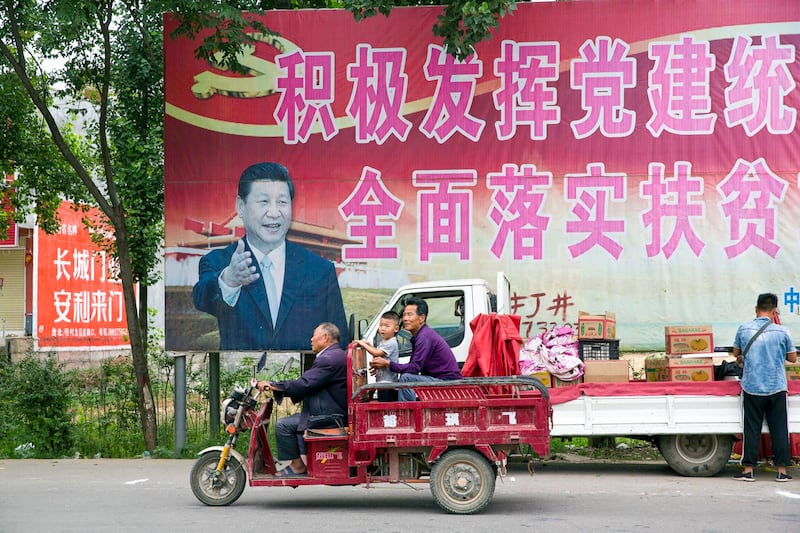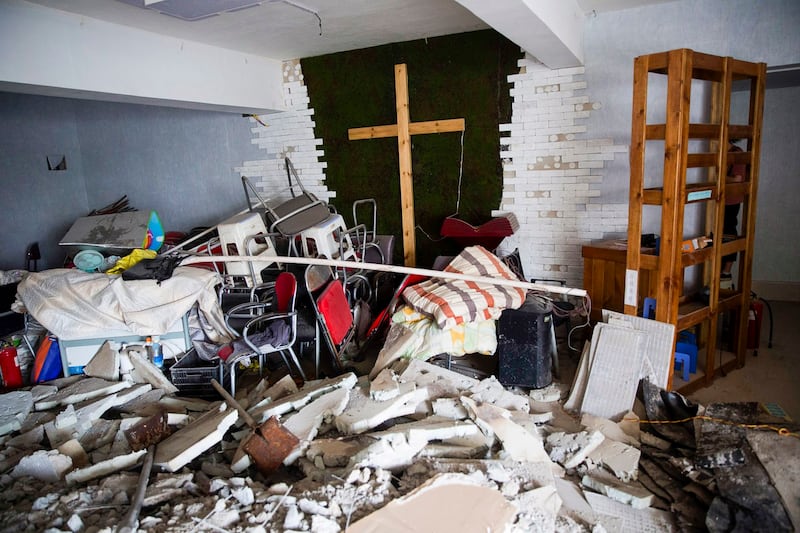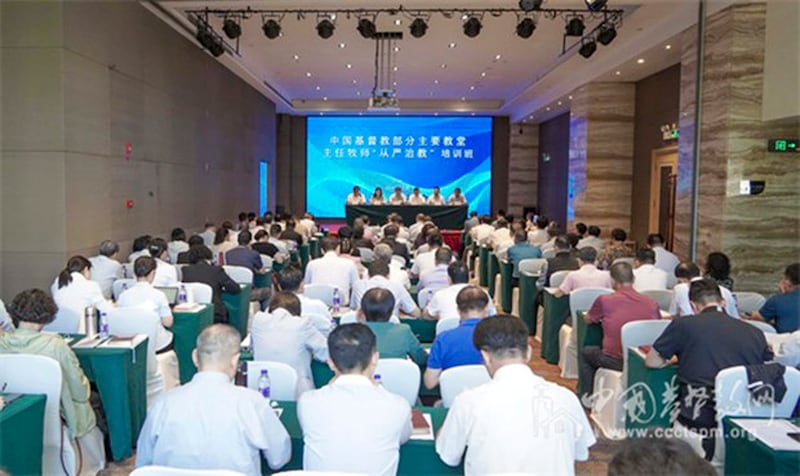China has been putting Protestant pastors through intensive training sessions intended to deliver "strict governance" of churches along patriotic and politically correct lines, according to an official church website.
Senior pastors from 100 major churches across China attended the training event in the southern city of Guangzhou on "deepening the sinicization" of church practices earlier this month, the official website The Protestant Church in China reported.
The July 8-12 seminar was part of the " sinicization" of religion program under ruling Chinese Communist Party leader Xi Jinping that ushered in a nationwide crackdown on Muslim, Christian and Tibetan Buddhist religious activities and venues since 2017.
Under the program, churches have had crosses removed and portraits of Xi installed, while mosques have lost their domes and minarets, and been remodeled in a style that appears more Chinese.
The Communist Party now requires all religious believers to love their country as well as their religion, and claims that patriotism is a part of those religions.

The training program for pastors was run by the party's outreach and influence arm, the United Front Work Department, the Protestant Church in China website said.
"The head pastors of major churches in various places ... said that strict governance of religion should be implemented throughout church governance and pastoral care of believers," the report said. "Strict governance of religion is an important guarantee for creating a more clean and upright social image for Christianity."
Li Jiahang, a former Chinese house church pastor now living in the United States who used a pseudonym for fear of reprisals, said the training program comes after Xi called at a Dec. 3-4 religious affairs work conference for religious organizations to "strengthen self-education, self-management, and self-restraint, comprehensively and strictly govern religion, and take the lead in abiding by laws and regulations."
"The purpose of this policy is to transform the whole of religious practice so that all religions are obedient [to Beijing]," Li said.
"Politics has to have the upper hand, while religion must serve politics," he said.
Xi’s tenet: Party control
John Lin, a Christian house church preacher who fled China to the United States last year and who uses a pseudonym for security reasons, said the "strict governance of religion" is an extension of Xi's tenet that the party should control every aspect of people's daily lives.
"The fundamental issue of strict governance of religion is whether you are governing religion strictly according to the principles of the Bible or according to the principles of Xi Jinping and the principles of the Chinese Communist Party," Lin said.
"Governing religion strictly according to the principles of the Chinese Communist Party inevitably leads to the so-called sinicization of Christianity," he said.
Lin said the Chinese Communist Party sees Christianity as a foreign import and a tool of Western colonial power.
"The point of decolonization is to cut off the connection between the church in China and the church in Western countries, the global church community," he said.
"Because if people are connected to the universal church, they could lean towards some of the universal values," he said, in a reference to freedom, democracy and human rights.

Guo Baosheng, a political commentator and pastor living in the United States and a former Chinese house church preacher,said the sinicization movement is part of Xi's vision of the "Chinese Dream," and he has been implementing it since taking power in 2012.
He said it began with the forcible removal of crosses and the remodeling of churches to look like Chinese temples, and the installation of surveillance cameras in churches.
The Guangzhou training course is part of the next phase, which means the sinicization of people's thinking, Guo said, giving China's territorial claim on democratic Taiwan as an example.
"It means that the
content of your sermons must be in line with Xi Jinping Thought," he said. "That may mean that the idea that Taiwan is an inseparable part of China should be included ... in church sermons."
"Another thing is the personal worship of Xi Jinping, which could turn into something like the Russian Orthodox Church's veneration of Putin or the worship of Hitler in Nazi Germany," Guo said.
RELATED STORIES
[ US: China still arresting ‘thousands’ each year for practicing faithOpens in new window ]
[ The story of one of Buddhism’s most revered figures, long missing, explainedOpens in new window ]
[ Interfaith conference seeks to raise awareness about Uyghur genocideOpens in new window ]
[ China remodels major mosque in Beijing to remove Middle Eastern influenceOpens in new window ]
Further tightening
He said he expects to see a further tightening of party control over the day-to-day running of Chinese churches, including their finances.
"They could even set up party branches in the larger churches," he said.
John Lin agreed.
"The purpose is to make Christianity adapt to socialism and become more communist," he said. "If they want to strengthen control over the country, then controlling religion is an important part of that."

The Chinese Communist Party, which embraces atheism, exercises tight controls over any form of religious practice among its citizens.
Churches are allowed to function if they are part of the government-backed Three-Self Patriotic Association. The three “selfs” refer to self-governance, self-support and self-propagation – essentially rejecting any foreign influence – and the “patriotic” refers to loyalty to the Chinese government.
State security police and religious affairs bureau officials frequently raid unofficial "house churches," although member churches have also been targeted at times.
China is home to an estimated 68 million Protestants, of whom 23 million worship in state-affiliated "Three-Self" churches, and some 9 million Catholics, the majority of whom are in state-sponsored organizations.
The authorities last year rolled out a database of approved religious leaders in a nationwide clampdown on who gets to practice religion, and how.

Translated by Luisetta Mudie.
